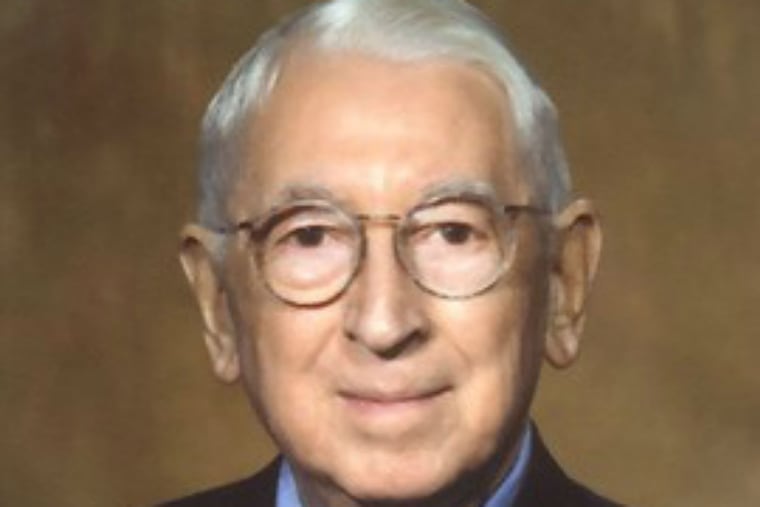Dr. Luther W. Brady, 92, renowned radiation oncologist
Though the extent of Dr. Brady's activities within the field of radiation oncology was extraordinary he saw himself as a clinician. He was very attentive to his patients.

Luther W. Brady, 92, of Society Hill, a renowned radiation oncologist and authority on tumors of the eye, died Friday, July 13, of cardiac arrest at Hahnemann University Hospital, where he had practiced medicine for more than a half-century.
Dr. Brady was a physician with an extraordinary range of activities within the field of radiation oncology, said a Hahnemann profile posted online. In addition to tumors of the eye, he treated masses of the orbit, breast, lung, and cervix, and cared for patients with malignant lymphoma and Hodgkin's disease. He did research, wrote widely, and lectured here and abroad.
Although he carried a heavy teaching load of medical students and residents in radiation oncology at Hahnemann, Dr. Brady considered himself first and foremost a clinician.
"Each patient was guaranteed at least an hour of face time per appointment, and at the end of the visit, he summarized the findings and proposed a [treatment] plan," Filip Troicki, a colleague, wrote in 2012 in Philadelphia Style magazine.
Dr. Brady believed that follow-ups were needed to ensure that there were no long-term complications from treatment. Those could be secondary cancers or scarring from radiation, Troicki wrote. Dr. Brady had one patient whom he saw for 35 years.
"His patients were very devoted to him," said his nephew, Theodore Yaeger, a radiation oncologist in Daytona Beach, Fla.
In 2006, Dr. Brady founded Philadelphia CyberKnife, a Havertown center featuring the first linear accelerator with a robotic arm for performing precise radiation treatment. The center's success spawned the creation of others, Troicki wrote.
"At the beginning everybody was very critical, but now there are seven of them in the Philadelphia area, so I guess imitation is the sincerest form of flattery," Troicki said Dr. Brady told him.
Born in Rocky Mount, N.C., Dr. Brady graduated from Wilson (N.C.) High School.
In the 1940s, he earned a bachelor's degree in zoology and a medical degree from George Washington University. He received post-graduate training at the U.S. Naval Hospital in Bethesda, Md.; Jefferson Medical College; and the Hospital of the University of Pennsylvania. He began practicing in 1956.
Dr. Brady's academic career was spent in Philadelphia, first at HUP and then, starting in the fall of 1959, at Hahnemann.
He was named professor in 1963 and in 1970 was appointed chair of Hahnemann's department of radiation oncology and nuclear medicine. When Hahnemann merged with Medical College of Pennsylvania in 1994, he was named head of the combined department of radiation oncology and nuclear medicine. He gave up the post in the late 1990s.
In 1975, he was named the Hylda Cohn/American Cancer Professor of Clinical Oncology. Hahnemann recognized Dr. Brady's professional commitment and dedication to the field in 1980 by naming its cancer center after him.
In 1999, the American Medical Association presented Dr. Brady with the AMA Distinguished Service Award Gold Medal. Later that year, the Philadelphia County Medical Society bestowed on him the 1999 Strittmatter Award, one of the highest honors for achievement in medicine in Pennsylvania.
At the time of his death, Dr. Brady was an affiliate faculty member in the department of radiation oncology at Drexel University College of Medicine. Drexel became formally affiliated with Hahnemann in 2002.
Dr. Brady had been president of every professional society related to his field. He was co-editor with Carlos A. Perez of the landmark textbook Principles and Practice of Radiation Oncology, published in its sixth edition in 2012.
Outside the medical realm, Dr. Brady supported the Philadelphia Museum of Art. He chaired the museum's executive committee and was a member of the board of trustees. In 1996, the Art Museum announced the establishment of the Luther W. Brady Curatorship of Japanese Art.
Timothy Rub, the George D. Widener Director and CEO of the museum, said: "His love for the arts — especially East Asian and contemporary art — was evident in everything that he did, and so, too, was his commitment to sharing this passion with others. For Luther, living with art and engaging with artists were acts of discovery and renewal. He will be deeply missed."
He loved music, especially opera. He served on the board of directors of the Opera Company of Philadelphia, Settlement Music School, and the Curtis Institute of Music.
Yaeger, his nephew, was a surrogate son. Also surviving is a niece, Chris Trimble.
Plans for a memorial service were pending. Interment will be private.
Memorial donations may be made to the Brady Cancer Research Institute, 230 N. Broad St., Philadelphia, Pa. 19102.